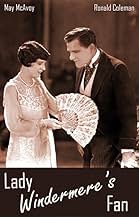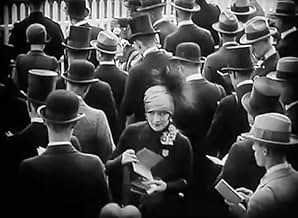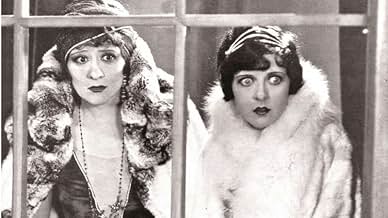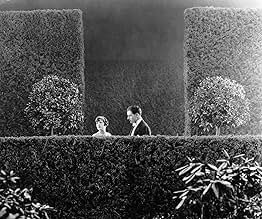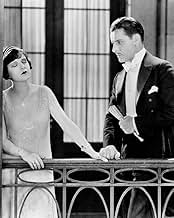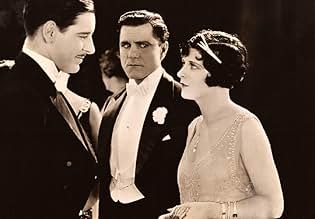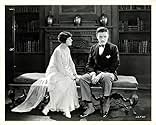IMDb RATING
7.2/10
1.5K
YOUR RATING
A society woman believes her husband is having an affair, a misconception which may have dire personal consequences for all involved.A society woman believes her husband is having an affair, a misconception which may have dire personal consequences for all involved.A society woman believes her husband is having an affair, a misconception which may have dire personal consequences for all involved.
- Awards
- 1 win total
Edward Martindel
- Lord Augustus Lorton
- (as Edw. Martindel)
Carrie Daumery
- The Duchess of Berwick
- (as Mme. Daumery)
Billie Bennett
- Lady Plymdale
- (uncredited)
Michael Dark
- Party Guest
- (uncredited)
Helen Dunbar
- Mrs. Cowper-Cowper
- (uncredited)
Frank Finch Smiles
- Waiter with Party Guest List
- (uncredited)
Larry Steers
- Party Guest
- (uncredited)
Ellinor Vanderveer
- Party Guest
- (uncredited)
Percy Williams
- Waiter at the Party
- (uncredited)
7.21.5K
1
2
3
4
5
6
7
8
9
10
Featured reviews
Pure cinema
Nobody was as savvy about the intricacies of the human heart as Lubitsch, and of how virtue is never an absolute.
This warmly empathetic, highly sophisticated gem is an adaptation of Oscar Wilde, with virtually none of the play's dialog utilized, but as suggestive and outrageous as Wilde himself, conceived, framed and edited as pure cinema.
From the exact same period as Cecil B. DeMille's infinitely more crass sex comedies and Charles Chaplin's equally brilliant and morally ambiguous 'The Woman of Paris', but carried by an indistinguishably European sensibility. Irene Rich as the woman who sacrifices herself in secret is impossibly glamorous and subtle, May McAvoy is truly heartbreaking as the socialite suspicious of her husband's philandering, but Ronald Colman, alas, is left with nothing much to do except smolder sexily at the fringes with those impertinently raised eyebrows.
A highlight is the Ascot game, a marvel of choreography and mime, a delicious baiting of upper class hypocrisy.
This warmly empathetic, highly sophisticated gem is an adaptation of Oscar Wilde, with virtually none of the play's dialog utilized, but as suggestive and outrageous as Wilde himself, conceived, framed and edited as pure cinema.
From the exact same period as Cecil B. DeMille's infinitely more crass sex comedies and Charles Chaplin's equally brilliant and morally ambiguous 'The Woman of Paris', but carried by an indistinguishably European sensibility. Irene Rich as the woman who sacrifices herself in secret is impossibly glamorous and subtle, May McAvoy is truly heartbreaking as the socialite suspicious of her husband's philandering, but Ronald Colman, alas, is left with nothing much to do except smolder sexily at the fringes with those impertinently raised eyebrows.
A highlight is the Ascot game, a marvel of choreography and mime, a delicious baiting of upper class hypocrisy.
Silent Oscar Wilde
Ernst Lubitsch was a great director with many wonderful films, his early work (his German silents) is more interesting than great but when he hit his stride from the late-20s onwards his very distinctive directing style sparkled at its best. Oscar Wilde was a tremendously influential, perceptive and subversive writer, his work having much drollness and bite. Have for a long time appreciated silent films highly, while there are ones that don't hold up the ones that have are very good and the best landmarks.
'Lady Windermere's Fan' is an interesting Wilde play. It is not one of my favourite works of his, 'The Importance of Being Ernest', 'The Selfish Giant' and 'The Picture of Dorian Grey' connect with me more and am more familiar with them too, but it is unmistakably Wilde in characterisation and prose. This 1925 film adaptation is great on its own terms and even if Lubitsch went on to do even better later 'Lady Windermere's Fan' is by far one of his best and most interesting silent films (and to me one of his first great films).
Don't expect a film that is one hundred percent faithful to the source material. As said, there is a lot of heavy re-working. Not that that is a bad thing, it makes no difference to me actually, but it is merely a word of warning for anybody that thinks the opposite. It also feels more Lubitsch than Wilde, which is not necessarily a bad thing. Absolutely love Lubitsch's directing style, very much in full display, which is full of wit, sophistication and irony.
While Wilde's typically perceptive depiction of humanity and its nature and the insightful approach to his characters remain, there isn't quite enough of his own wit and subversiveness. There is absolutely evidence of them and the two styles generally don't clash surprisingly, but Lubitsch's directing makes more of a splash here.
Visually, 'Lady Windermere's Fan' looks great. Very sumptuously designed and costumed and there are some stylish shots that are expansive enough to avoid it from feeling too much of a filmed play or too claustrophobic. Lubitsch's direction is clever and elegant throughout, no rough around the edges feel or any signs of disinterest. It is very well performed and with more subtlety than a fair share of silent films from this period, with the best performance coming from Irene Rich as the most interesting character. She really does lighten up the screen.
All the conflicts are done with tension but also in a witty and sophisticated fashion, and the actors interact very naturally, no stiffness or disconnection here. The story is fun and charming, any harshness in the conflict done with bite and nuance. It goes at a lively enough pace, helped by that Lubitsch doesn't take the material too seriously, and doesn't get bogged down by staginess or over-reliance on anything that could potentially deaden the pace (i.e. title cards). The characters are interesting and Wilde's perceptive approach towards them is maintained.
On the whole, great. 9/10
'Lady Windermere's Fan' is an interesting Wilde play. It is not one of my favourite works of his, 'The Importance of Being Ernest', 'The Selfish Giant' and 'The Picture of Dorian Grey' connect with me more and am more familiar with them too, but it is unmistakably Wilde in characterisation and prose. This 1925 film adaptation is great on its own terms and even if Lubitsch went on to do even better later 'Lady Windermere's Fan' is by far one of his best and most interesting silent films (and to me one of his first great films).
Don't expect a film that is one hundred percent faithful to the source material. As said, there is a lot of heavy re-working. Not that that is a bad thing, it makes no difference to me actually, but it is merely a word of warning for anybody that thinks the opposite. It also feels more Lubitsch than Wilde, which is not necessarily a bad thing. Absolutely love Lubitsch's directing style, very much in full display, which is full of wit, sophistication and irony.
While Wilde's typically perceptive depiction of humanity and its nature and the insightful approach to his characters remain, there isn't quite enough of his own wit and subversiveness. There is absolutely evidence of them and the two styles generally don't clash surprisingly, but Lubitsch's directing makes more of a splash here.
Visually, 'Lady Windermere's Fan' looks great. Very sumptuously designed and costumed and there are some stylish shots that are expansive enough to avoid it from feeling too much of a filmed play or too claustrophobic. Lubitsch's direction is clever and elegant throughout, no rough around the edges feel or any signs of disinterest. It is very well performed and with more subtlety than a fair share of silent films from this period, with the best performance coming from Irene Rich as the most interesting character. She really does lighten up the screen.
All the conflicts are done with tension but also in a witty and sophisticated fashion, and the actors interact very naturally, no stiffness or disconnection here. The story is fun and charming, any harshness in the conflict done with bite and nuance. It goes at a lively enough pace, helped by that Lubitsch doesn't take the material too seriously, and doesn't get bogged down by staginess or over-reliance on anything that could potentially deaden the pace (i.e. title cards). The characters are interesting and Wilde's perceptive approach towards them is maintained.
On the whole, great. 9/10
Word master Oscar Wilde's play as a silent movie?
Perhaps only Ernst Lubitsch could have created this masterpiece, a play by one of the world's greatest users of words turned into a silent motion picture.
I remember seeing this at the late and very lamented Silent Movie Theatre on Fairfax in Los Angeles, in the 1970s. And I remember marveling then how Lubitsch was able to create such a magnificent work.
Yes, he had the help of superlative actors -- May McAvoy's performance was truly a revelation -- and of course had the basic Wilde play as well as Julien Josephson's adaption, but it's his camera placement and where the actors performed that make this such a wonder.
I cannot recommend too strongly this "Lady Windermere's Fan," but when you go to YouTube, be careful to check out the various editions before you settle down to watch. One is terrible, but the one I saw is great. Worthy of a great movie.
I remember seeing this at the late and very lamented Silent Movie Theatre on Fairfax in Los Angeles, in the 1970s. And I remember marveling then how Lubitsch was able to create such a magnificent work.
Yes, he had the help of superlative actors -- May McAvoy's performance was truly a revelation -- and of course had the basic Wilde play as well as Julien Josephson's adaption, but it's his camera placement and where the actors performed that make this such a wonder.
I cannot recommend too strongly this "Lady Windermere's Fan," but when you go to YouTube, be careful to check out the various editions before you settle down to watch. One is terrible, but the one I saw is great. Worthy of a great movie.
Silence, Please, No Epigrams
"Lady Windermere's Fan" is a master class in silent film adaptation by Ernst Lubitsch of Oscar Wilde's play of the same name. Bringing one of Wilde's works, which are justifiably renowned for their clever word play, especially the epigrams, to the silent screen seems an act of folly, but no filmmaker at the time, and perhaps since, had a better sense of visual wit than Lubitsch--an appreciation that extended to the entire withdrawal of Wilde's epigrams from this adaptation, to be replaced largely by the sort of amusing visual gags and situations of the sophisticated romantic comedy, which was then just emerging in cinema, such as in Lubitsch's prior "The Marriage Circle" (1924), and, more specifically, that evolved into the comedy of remarriage genre.
Despite Wilde's caustic wit putting high society in its place, so to speak, the resolution of the play was a product of the Victorian morals and age in which it was written, especially in regards to the role of women as faithful wives and mothers and nothing else. Not only did Lubitsch update it to the modern Roaring Twenties in the sense that there were now automobiles instead of horse-drawn carriages, but he likewise updated its lapses into moralism with a farce that's playful to the end. Additionally, instead of preserving the play's not-so-surprising revelation that Mrs. Erlynne is Lady Windermere's mother, it announces this in Edith Erlynne's first scene; consequently, allowing for much of the humor and intrigue to be restructured around the dramatic irony of the spectator knowing what the characters do not. The updating also remakes Edith into something of a vamp or a flapper, including her wardrobe distinguishing her from the high-society clique. And, although she wishes to join their ranks, so as to marry, she also seems to relish the attention her appearance as a deviant brings her, especially from the opposite sex. I also find it amusing how she recklessly tosses her cigarettes aside rather than placing them in the ashtrays that are always nearby (two subsequent adaptations, "The Fan" (1949) and "A Good Woman" (2004), contain more obvious jokes based on Mrs. Erlynne's smoking). Although Irene Rich as Edith appears fourth in the credits, including below the star-in-the-making Ronald Colman as Lord Darlington, the play's cad, this is Rich's picture. Behind the screen, they must've known this, too, as she steals the show down to the delightfully-altered ending, although the supporting cast is quite amusing, too.
While having the unduplicated distinction of being the most prestigious director in two nations, Germany and, then, the U.S., and in both the silent and sound eras, both critically and in terms of studio clout, it doesn't seem that Lubitsch receives as much appreciation nowadays as do some other filmmakers of his era. Regardless, his "touch" is evident here, from the smart adaptation, well-crafted pacing, grand set design and the peerless comedic timing. And, this was Lubitsch's picture, as Warner Bros. gave him the rare artistic freedom for studio productions, from story selection to final cut. The original racetrack scene is a brilliant series of looks, of binocular-masked point-of-view shots and reverse angles, as Lubitsch parodies society's busybodies cackling over the sight of Edith. Throughout the picture, this system of looks is repeated in scenes where characters peer out windows. At the end of the racetrack scene, there's also a creative shot of Edith passing an "Exit" sign, as Lord Lorton follows her and a wipe closes out the scene just at the right point. Another shot relies for its comedic effect on no camera movement or editing and entirely upon how Lady Windermere re-enters the shot as she debates whether to search her husband's desk drawer.
This would be a rich film to study for its more technical aspects alone: the editing, camera placement, production design, blocking. The garden scene in the party sequence is another good example of this--how the obscuring of the spectator's view of Lady Windermere and Lord Darlington's interaction adds comedic effect while that of Edith's interaction as witnessed by Lady Windermere compounds the dramatic irony. Additionally, Lubitsch was once derisively called the "director of doors" by Mary Pickford, due to their contentious collaboration on "Rosita" (1923), and there's good, if at first seemingly puzzling, reason for the moniker. I believe his emphasis on doors is the backbone of the films' pacing, the movement of the characters and the edits. Even though he insisted on always showing characters enter and exit every door, this film has a decent average shot length of 7.4 seconds, which is also surely helped by the sparing use of intertitles. And those title cards tend to add to the farce, such as the scene focusing on the relation of a gentleman to a lady being indicated by the manner in which he rings her doorbell, which is doubly humorous when considering the director's already-established fascination with the entryways, that he now is diving into their detail with doorbells. Even when a shot seems at first to linger needlessly on the sight of a door being opened and closed, such as when Lady Windermere leaves the garden, it serves a purpose; in that case, it anticipates Edith's following her. It also helps that the doors tend to be absurdly gigantic, with doorknobs sometimes reaching near faces. The enormous sets in general, when aided by well-timed long-shot framings, add literalism to the satirical smallness of the characters amid high-handed society and personal shortcomings.
It's also notable that Lubitsch and company also adapted a 1916 version of the same story and reworked some of its alterations in "opening up" what was originally a three-sets and four-acts play. Film historian Charles Musser goes into some detail comparing the two in the essay, "The Hidden and the Unspeakable: On Theatrical Culture, Oscar Wilde and Ernst Lubitsch's Lady Windermere's Fan." The 1916 film, however, is primitively filmed from distant camera positions, bogged down by wordy title cards, with histrionic acting and more moralizing than even in Wilde's original, but without the satire. This 1925 iteration improves on all of this: an intricate use of the camera based on looks--what characters see and misbelieve they see--, nuanced performances that are allowed to display the registering of character thoughts though a more intimate camera and a pacing that is patient and yet remains energetic, lush settings and aided by the translating of the written witticisms into visual wit.
Despite Wilde's caustic wit putting high society in its place, so to speak, the resolution of the play was a product of the Victorian morals and age in which it was written, especially in regards to the role of women as faithful wives and mothers and nothing else. Not only did Lubitsch update it to the modern Roaring Twenties in the sense that there were now automobiles instead of horse-drawn carriages, but he likewise updated its lapses into moralism with a farce that's playful to the end. Additionally, instead of preserving the play's not-so-surprising revelation that Mrs. Erlynne is Lady Windermere's mother, it announces this in Edith Erlynne's first scene; consequently, allowing for much of the humor and intrigue to be restructured around the dramatic irony of the spectator knowing what the characters do not. The updating also remakes Edith into something of a vamp or a flapper, including her wardrobe distinguishing her from the high-society clique. And, although she wishes to join their ranks, so as to marry, she also seems to relish the attention her appearance as a deviant brings her, especially from the opposite sex. I also find it amusing how she recklessly tosses her cigarettes aside rather than placing them in the ashtrays that are always nearby (two subsequent adaptations, "The Fan" (1949) and "A Good Woman" (2004), contain more obvious jokes based on Mrs. Erlynne's smoking). Although Irene Rich as Edith appears fourth in the credits, including below the star-in-the-making Ronald Colman as Lord Darlington, the play's cad, this is Rich's picture. Behind the screen, they must've known this, too, as she steals the show down to the delightfully-altered ending, although the supporting cast is quite amusing, too.
While having the unduplicated distinction of being the most prestigious director in two nations, Germany and, then, the U.S., and in both the silent and sound eras, both critically and in terms of studio clout, it doesn't seem that Lubitsch receives as much appreciation nowadays as do some other filmmakers of his era. Regardless, his "touch" is evident here, from the smart adaptation, well-crafted pacing, grand set design and the peerless comedic timing. And, this was Lubitsch's picture, as Warner Bros. gave him the rare artistic freedom for studio productions, from story selection to final cut. The original racetrack scene is a brilliant series of looks, of binocular-masked point-of-view shots and reverse angles, as Lubitsch parodies society's busybodies cackling over the sight of Edith. Throughout the picture, this system of looks is repeated in scenes where characters peer out windows. At the end of the racetrack scene, there's also a creative shot of Edith passing an "Exit" sign, as Lord Lorton follows her and a wipe closes out the scene just at the right point. Another shot relies for its comedic effect on no camera movement or editing and entirely upon how Lady Windermere re-enters the shot as she debates whether to search her husband's desk drawer.
This would be a rich film to study for its more technical aspects alone: the editing, camera placement, production design, blocking. The garden scene in the party sequence is another good example of this--how the obscuring of the spectator's view of Lady Windermere and Lord Darlington's interaction adds comedic effect while that of Edith's interaction as witnessed by Lady Windermere compounds the dramatic irony. Additionally, Lubitsch was once derisively called the "director of doors" by Mary Pickford, due to their contentious collaboration on "Rosita" (1923), and there's good, if at first seemingly puzzling, reason for the moniker. I believe his emphasis on doors is the backbone of the films' pacing, the movement of the characters and the edits. Even though he insisted on always showing characters enter and exit every door, this film has a decent average shot length of 7.4 seconds, which is also surely helped by the sparing use of intertitles. And those title cards tend to add to the farce, such as the scene focusing on the relation of a gentleman to a lady being indicated by the manner in which he rings her doorbell, which is doubly humorous when considering the director's already-established fascination with the entryways, that he now is diving into their detail with doorbells. Even when a shot seems at first to linger needlessly on the sight of a door being opened and closed, such as when Lady Windermere leaves the garden, it serves a purpose; in that case, it anticipates Edith's following her. It also helps that the doors tend to be absurdly gigantic, with doorknobs sometimes reaching near faces. The enormous sets in general, when aided by well-timed long-shot framings, add literalism to the satirical smallness of the characters amid high-handed society and personal shortcomings.
It's also notable that Lubitsch and company also adapted a 1916 version of the same story and reworked some of its alterations in "opening up" what was originally a three-sets and four-acts play. Film historian Charles Musser goes into some detail comparing the two in the essay, "The Hidden and the Unspeakable: On Theatrical Culture, Oscar Wilde and Ernst Lubitsch's Lady Windermere's Fan." The 1916 film, however, is primitively filmed from distant camera positions, bogged down by wordy title cards, with histrionic acting and more moralizing than even in Wilde's original, but without the satire. This 1925 iteration improves on all of this: an intricate use of the camera based on looks--what characters see and misbelieve they see--, nuanced performances that are allowed to display the registering of character thoughts though a more intimate camera and a pacing that is patient and yet remains energetic, lush settings and aided by the translating of the written witticisms into visual wit.
good, but not Lubitsch's best
I agree with the other reviewers that Lubitsch did a great job reworking parts of Wilde's play to make it suitable for silent film, and adding some of his signature touches. But I don't think the movie stands up to some of his later pieces, such as "Trouble in Paradise" and "Design for Living" (also reworked from a famous play, to good advantage). "Lady Windermere's Fan" is much more slow-paced, which can make it hard for a modern viewer, and not all of the characters are as interesting. However, the performances are good, especially the marvelous Irene Rich (whose high-fashion costumes are endlessly entertaining), the production values are high, and if you have the patience, you will be rewarded with some nice little bits of Lubitsch's social observation. It's interesting to consider how drastically attitudes toward male-female relations have changed over the decades: the film's plot depends on beliefs that have mostly, and rightfully, vanished. In contrast to convention, Lubitsch obviously enjoyed helping Rich create an older woman who was fascinating and sexually powerful.
Did you know
- TriviaOne of the 50 films in the three-disk boxed DVD set called "More Treasures from American Film Archives, 1894-1931" (2004), compiled by the National Film Preservation Foundation from five American film archives. This film is preserved by the Museum of Modern Art, has a running time of 89 minutes and an added piano music score.
- Quotes
Opening title card: Lady Windermere faced the grave problem of seating her dinner guests.
- ConnectionsFeatured in Historia del cine: Epoca muda (1983)
- How long is Lady Windermere's Fan?Powered by Alexa
Details
- Release date
- Country of origin
- Language
- Also known as
- Tajna ledi Vindermir
- Filming locations
- Toronto, Ontario, Canada(Racetrack Scene)
- Production company
- See more company credits at IMDbPro
Box office
- Budget
- $320,000 (estimated)
- Runtime
- 2h(120 min)
- Sound mix
- Aspect ratio
- 1.33 : 1
Contribute to this page
Suggest an edit or add missing content

